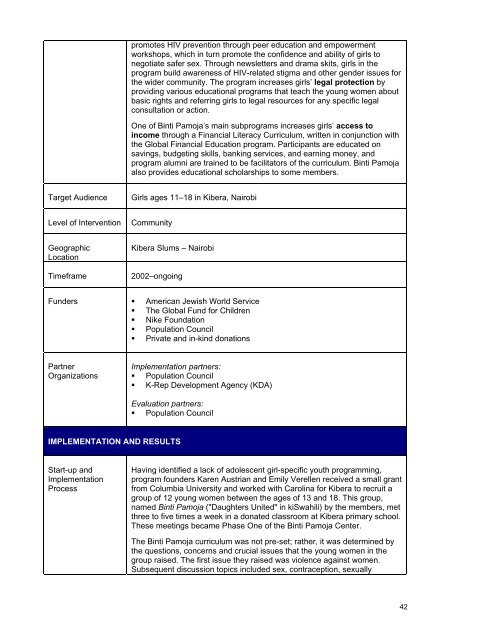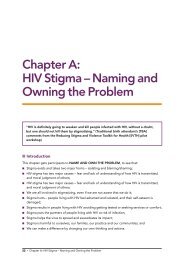Implementing Multiple Gender Strategies to Improve HIV and ... - ICRW
Implementing Multiple Gender Strategies to Improve HIV and ... - ICRW
Implementing Multiple Gender Strategies to Improve HIV and ... - ICRW
Create successful ePaper yourself
Turn your PDF publications into a flip-book with our unique Google optimized e-Paper software.
promotes <strong>HIV</strong> prevention through peer education <strong>and</strong> empowerment<br />
workshops, which in turn promote the confidence <strong>and</strong> ability of girls <strong>to</strong><br />
negotiate safer sex. Through newsletters <strong>and</strong> drama skits, girls in the<br />
program build awareness of <strong>HIV</strong>-related stigma <strong>and</strong> other gender issues for<br />
the wider community. The program increases girls’ legal protection by<br />
providing various educational programs that teach the young women about<br />
basic rights <strong>and</strong> referring girls <strong>to</strong> legal resources for any specific legal<br />
consultation or action.<br />
One of Binti Pamoja’s main subprograms increases girls’ access <strong>to</strong><br />
income through a Financial Literacy Curriculum, written in conjunction with<br />
the Global Financial Education program. Participants are educated on<br />
savings, budgeting skills, banking services, <strong>and</strong> earning money, <strong>and</strong><br />
program alumni are trained <strong>to</strong> be facilita<strong>to</strong>rs of the curriculum. Binti Pamoja<br />
also provides educational scholarships <strong>to</strong> some members.<br />
Target Audience<br />
Girls ages 11–18 in Kibera, Nairobi<br />
Level of Intervention<br />
Community<br />
Geographic<br />
Location<br />
Timeframe<br />
Kibera Slums – Nairobi<br />
2002–ongoing<br />
Funders • American Jewish World Service<br />
• The Global Fund for Children<br />
• Nike Foundation<br />
• Population Council<br />
• Private <strong>and</strong> in-kind donations<br />
Partner<br />
Organizations<br />
Implementation partners:<br />
• Population Council<br />
• K-Rep Development Agency (KDA)<br />
Evaluation partners:<br />
• Population Council<br />
IMPLEMENTATION AND RESULTS<br />
Start-up <strong>and</strong><br />
Implementation<br />
Process<br />
Having identified a lack of adolescent girl-specific youth programming,<br />
program founders Karen Austrian <strong>and</strong> Emily Verellen received a small grant<br />
from Columbia University <strong>and</strong> worked with Carolina for Kibera <strong>to</strong> recruit a<br />
group of 12 young women between the ages of 13 <strong>and</strong> 18. This group,<br />
named Binti Pamoja ("Daughters United" in kiSwahili) by the members, met<br />
three <strong>to</strong> five times a week in a donated classroom at Kibera primary school.<br />
These meetings became Phase One of the Binti Pamoja Center.<br />
The Binti Pamoja curriculum was not pre-set; rather, it was determined by<br />
the questions, concerns <strong>and</strong> crucial issues that the young women in the<br />
group raised. The first issue they raised was violence against women.<br />
Subsequent discussion <strong>to</strong>pics included sex, contraception, sexually<br />
42
















